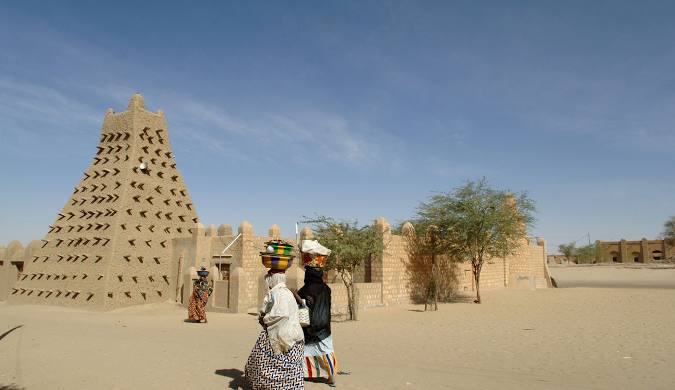Timbuktu , Mali
🏜️ Timbuktu, Mali: The Fabled City of Gold & Learning
🗓️ Best time to visit: November – February (cooler, dry season)
🕌 Ideal for: History buffs • Cultural travelers • UNESCO heritage fans
⭐ Overall Rating: 8.5 / 10
📖 Why Visit Timbuktu?
Once a legendary city of gold, Timbuktu is a name that echoes through time as a symbol of mystery, wealth, and learning. Located at the edge of the Sahara Desert in northern Mali, this UNESCO World Heritage Site was a hub of Islamic scholarship and trans-Saharan trade between the 12th and 16th centuries.
Timbuktu is more than just a mythical name — it's a living city steeped in history, with mud-brick architecture, ancient libraries, and stories that trace back to the golden age of Africa.
🕌 Top Attractions in Timbuktu
| Site | Description |
|---|---|
| Djinguereber Mosque | Built in 1327, this iconic structure is one of the oldest mosques in Africa, made entirely of mud and wood |
| Sankore University & Mosque | Once one of the world's most important centers of Islamic learning |
| Ahmed Baba Institute | Holds thousands of ancient manuscripts on science, math, and philosophy, some over 700 years old |
| House of Explorers | Visit where European explorers like René Caillié stayed during their historic expeditions |
| Local Artisan Markets | Buy handmade leather goods, Tuareg silver, and colorful woven textiles from Mali’s desert communities |
📚 Legacy of Learning
Timbuktu once housed over 700,000 manuscripts, written in Arabic and African languages, making it one of the greatest ancient centers of scholarship. Scholars from all over the Islamic world came here to learn and debate.
Today, efforts continue to preserve and digitize these priceless texts, many hidden by locals during times of conflict.
🐪 Cultural Experiences
-
🏜️ Desert Tours: Ride a camel into the Sahara and camp under the stars with Tuareg guides.
-
🪘 Traditional Music: Hear haunting desert blues and ancient rhythms in local gatherings or festivals.
-
🧕 Tuareg Heritage: Learn about the nomadic Tuareg culture that has thrived in this region for centuries.
🍴 Local Cuisine to Try
-
Tô – Millet or sorghum-based porridge, often served with a spicy sauce.
-
Yassa chicken – Marinated chicken with onions and lemon, with rice or couscous.
-
Camel meat stew – A local delicacy, often spiced with desert herbs.
-
Ginger tea – Strong and sweet, this is a staple in the Tuareg tea ceremony.
🏨 Where to Stay in Timbuktu
| Type | Recommended Stay |
|---|---|
| Guesthouse | Hotel La Maison – Traditional mud architecture, close to city landmarks |
| Boutique | Auberge du Désert – Cozy, with desert views and warm hospitality |
| Adventure | Nomadic desert camp – For the brave, sleep in the sands just outside the city |
📊 Timbuktu Travel Ratings
| Category | Rating | Notes |
|---|---|---|
| 🏛️ Historical Significance | 10.0 | A true world treasure with ancient Islamic and African heritage |
| 🕌 Architecture & Landmarks | 8.5 | Unique mud mosques and ancient buildings |
| 📚 Cultural & Educational Value | 9.0 | Rich history of manuscripts and scholarship |
| 🏞️ Scenery & Atmosphere | 7.5 | Stark desert beauty, very peaceful |
| 🚗 Accessibility | 6.0 | Can be hard to reach due to desert location and security issues |
| 🧭 Adventure & Exploration | 8.5 | Desert tours, Tuareg experiences, remote feel |
| 🍴 Local Experience & Cuisine | 7.5 | Traditional, rustic dining with unique local flavors |
➡️ Overall Rating: 8.5 / 10
📍 Travel Tips for Timbuktu
-
🔐 Safety First: Always check current security advisories and travel with a guide or tour operator.
-
🐪 Dress Light & Modest: Desert temperatures vary greatly. Light clothing by day, layers for cooler nights.
-
📸 Photography Etiquette: Always ask before taking photos of locals or sacred places.
-
📚 Support the Culture: Buy crafts, books, or take tours with local guides to support preservation efforts.
✅ Is Timbuktu Worth Visiting?
Absolutely — if you’re a traveler with a love for ancient history, African heritage, and places off the beaten path, Timbuktu is a once-in-a-lifetime destination. It’s more than a myth — it’s a doorway to Africa’s golden intellectual past.


